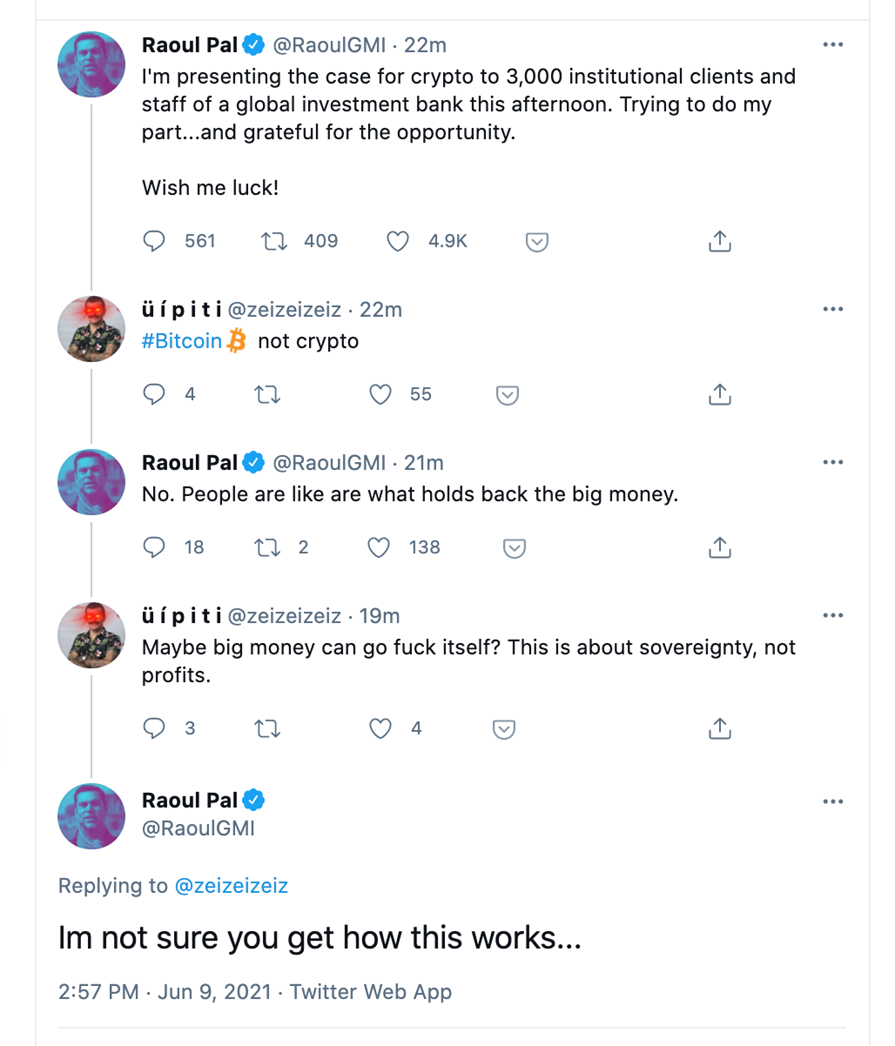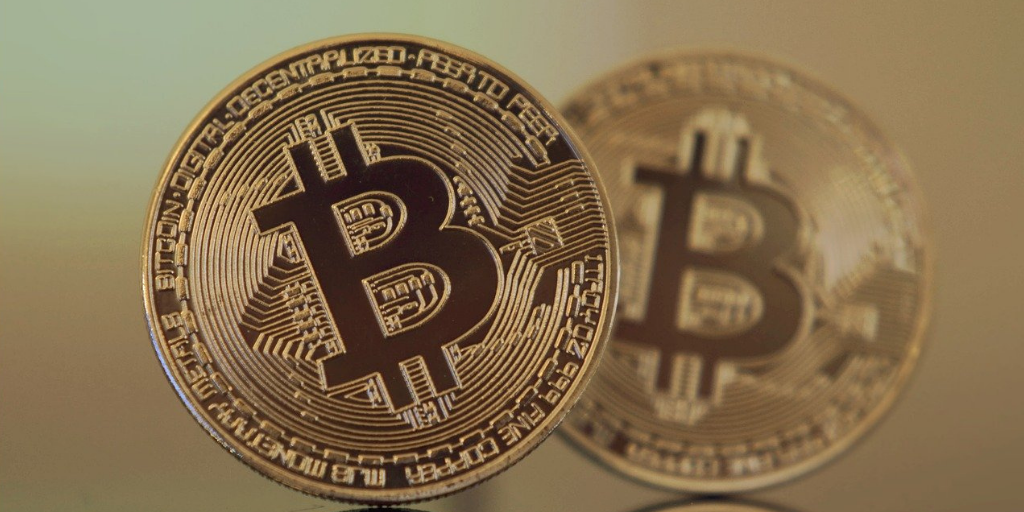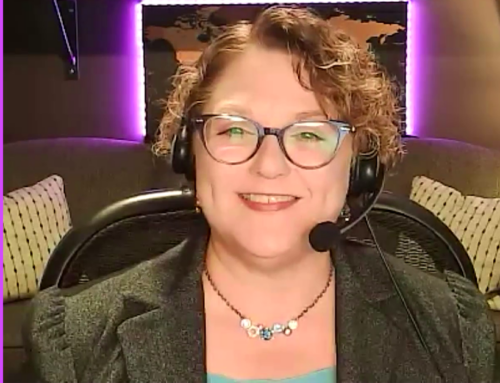In my first business trip since February 2020, I flew to Miami and hung out with my 12,000 closet friends at the Bitcoin 2021 conference. Here’s the good, the indifferent, and the ugly from my perspective.
The Good
First, there are some very talented, well-intentioned people working in the Bitcoin space. Many of them are attracted to Bitcoin because it offers people in the developing world and others on the low-end of the economic spectrum a way to store and transfer value without fear of confiscation or high fees from third parties.
Alex Gladstein, the chief strategy officer at the Human Rights Foundation, is a good example (he interviewed Twitter and Square co-founder Jack Dorsey at the conference). As a champion of free and open societies, Gladstein believes Bitcoin is a way for people living under authoritarian regimes to gain some measure of individual freedom. Here’s a 2-minute video he narrates that explains why Bitcoin matters for human rights.
Second, many others have their heart in the right place, even if some of their tactics are juvenile. Many Bitcoiners seem genuinely interested in helping the less fortunate in our society gain money freedom and they see Bitcoin as the best hope for leveling the money playing field. Jack Mallers, who was instrumental in getting El Salvador (I know, El Salvador is not exactly a role model country) to move toward making bitcoin legal tender, made an impassioned presentation at the conference that had him crying along with many in the audience. Side note, he drops some F-bombs.
And, news flash, El Salvador just approved Bitcoin as legal tender on June 9. Full story here.
Third, people attracted to Bitcoin feel part of a community. Aside from the technical and social construct achievement of Bitcoin, this community aspect was on full display at Bitcoin 2021 and is one of its strongest appeals. I know, “money” and a store of value like Bitcoin is not supposed to have “community” as one of its features but Bitcoin is a unique animal. I had numerous conversations with random strangers whether it was standing in line or sitting next to them at a session and they were all pleasant, interesting, and had unique stories that attracted them to Bitcoin.
Fourth, along with the community, there’s a strong cultural element around Bitcoin. We’ve all seen the meme culture and the NFT craze taking place. The Bitcoin 2021 conference added to it by hosting a popup Bitcoin art gallery that was actually pretty cool. Tangible as well as digital art was on display and I was tempted to take some home with me.
Fifth, the Bitcoin world is clearly expanding from teenagers and twenty-something bros to Wall Street. Just walking around you could pick out the “Wall Streeters” in the crowd and it’s clear that Wall Street is heading to the decentralized world (even if they come kicking and screaming). And Mike Novagratz mentioned that Morgan Stanley has already had 4,000 of their advisors go through a Bitcoin training course (See here at 4:12:45 into the video). Bitcoin started with cypherpunks but is being adopted by the monied class.
The Indifferent
First, there’s a struggle between the Bitcoiners who approach Bitcoin from a cypherpunk ethos and those who see a role for government regulation and oversight in making Bitcoin “safer” and thus more palatable to the masses.
Along those same lines, I attended a satellite Bitcoin 2021 event titled “The Soul of Bitcoin” that was billed as “An event where deep thinkers are gathering to philosophize about Bitcoin.” It featured a talk and Q&A with prominent Bitcoiner Robert Breedlove. He spoke for about an hour and for the other two hours, I was in deep conversation with six other people. Two were from Canada, two from Mexico, one from Kansas City, and one was traveling the country for a year with no home base.
We talked about… self-sovereignty, libertarianism, and the role of government. Interestingly, the group was split. A couple were hardcore “get rid of government and let me be free” people while a couple (looks in the mirror) were much more moderate and see a role for government and are willing to make some tradeoffs in freedom for a well-functioning society. The other two were pretty quiet. My point is that Bitcoin attracts freedom-loving libertarians who want to get rid of government and hire their own security force, as well as progressive liberals who see Bitcoin as a way to bring social justice, inclusivity, and economic empowerment to those who have little of it today (Listen to my podcast with Tyrone Ross about Bitcoin as digital social justice). To be fair, those extremes are not necessarily mutually exclusive, but they definitely start from different ends of the spectrum. Second, there’s a split between “Bitcoin only” people and others who think there’s plenty of room for lots of other cryptocurrencies. In other words, you have your pure Bitcoin evangelists who think everything else is a shit coin and others who are fine buying Ethereum and Dogecoin. This split, while likely long-term healthy as it makes the pie bigger, creates short-term tribalism as the two camps tend not to mix well. Here’s an example of this divide from Twitter that happened yesterday. Third, I didn’t leave the Bitcoin 2021 event feeling more bullish on Bitcoin. Maybe it’s because I listen to so many Bitcoin and crypto podcasts and read so much that there was little new that I heard at the conference (or maybe because I’m already bullish on Bitcoin). In fact, I think this is an issue for conferences in general. Pretty much any conference speaker will already have been on lots of podcasts, written books or have YouTube videos so you don’t need to go to an in-person conference to get their “material.” And while it was fun to see the Winklevoss twins and Jack Dorsey in person, going forward, I have a high bar to attend business conferences. With that said, the side conversations and deep dive events do make some business conferences well worth the price of admission. And I’m definitely glad I attended the Bitcoin 2021 conference as the side convos were golden. The Ugly First, there’s a toxic element to Bitcoin culture that turns me off. Case in point. There was a session titled: Toxic Maximalism: A Feature Not a Bug. And it featured four Bitcoin maximalists who spewed an aggressive form of “Bitcoin fixes this.” They throw around F-bombs like I use conjunctions. One of these maximalists said, “If you’re against toxic maximalism, you are against Bitcoin and you are against freedom.” Many in the audience applauded that comment while I thought to myself, that approach will never bring the mainstream to Bitcoin (To listen to this full session, click here and it starts at 6 hours and 53 minutes in). Fortunately, at the beginning of the next session, OG Erik Vorhees, a voice of reason, said out loud what I was thinking about the toxic maximalism session–watch his 28-second mic drop clip. To be fair, these hardcore Bitcoiners serve a purpose in rallying the troops and I would argue have been instrumental in “carrying the flag” for Bitcoin during the crypto winters. In fact, I heard many say “I’ll die on this hill” at the conference. That kind of devotion creates a floor in the Bitcoin price as these people don’t care if they lose all their money; it’s “to the moon or bust” for them. And clearly, these toxic maximalists are talking to a young audience to whom this toxic talk is a welcome tribal marker. Second, if we reach hyperbitcoinization, there’s no telling what the world will look like and what we had to go through to get there. Hyperbitcoinization is the point where Bitcoin is the dominant global currency. Many Bitcoiners see that as the goal. If that happened, it would be a completely different world than we know today and would likely involve hyperinflation, the destruction of institutions, and a complete rearrangement of the world map. That would get ugly. Conclusion Bitcoin is here to stay. Whether you like it or not, it will become ubiquitous and a fact of life. I encourage you to keep learning about it. The longer you fight it, the harder it will be when you have to capitulate. Subscribing to my Digital Money Advisor Podcast is a good place to start your learning journey.





